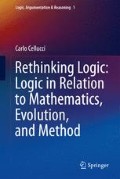Abstract
When dealing with logic, the following three questions naturally arise:
Access this chapter
Tax calculation will be finalised at checkout
Purchases are for personal use only
Notes
- 1.
Diels and Kranz (1964, 28 B 8.60).
- 2.
Ibid., 28 B 12.3.
- 3.
Plato, Philebus, 28 d 6–9.
- 4.
Plato, Gorgias, 508 a 3.
- 5.
Plato, Timaeus, 28 c 3–4.
- 6.
Ibid., 29 a 6–7.
- 7.
Aristotle, Metaphysica, Λ 7, 1072 b 14.
- 8.
Ibid., Λ 7, 1072 b 19–20.
- 9.
Ibid., Λ 7, 1071 b 12–13.
- 10.
Aristotle, Ethica Eudemea, Θ 2, 1248 a 26–27.
- 11.
Diels and Kranz (1964, 28 B 2.1).
- 12.
Ibid., 28 B 8.60.
- 13.
Plato, Timaeus, 90 c 7–d 1.
- 14.
Ibid., 47 c 3.
- 15.
Aristotle, Ethica Nicomachea, K 7, 1177 a 13–16.
- 16.
Aristotle, Metaphysica, Λ 7, 1072 b 24–25.
- 17.
Diels and Kranz (1964, 28 B 1.2–3).
- 18.
Ibid., 28 B 2.4.
- 19.
Plato, Phaedrus, 270 c 10–d 1.
- 20.
Ibid., 270 d 9–e 2.
- 21.
Aristotle, Metaphysica, α 3, 995 a 12–13.
- 22.
Diels and Kranz (1964, 28 B 7.1).
- 23.
Ibid., 22 B 8.11.
- 24.
Plato, Phaedo, 90 b 7.
- 25.
Plato, Sophista, 227 a 8.
- 26.
Aristotle, Sophistici Elenchi, 34, 183 a 37–38.
- 27.
Diels and Kranz (1964, 28 B 1.28–29).
- 28.
Plato, Respublica, VII 532 a 7–b 2.
- 29.
Aristotle, Analytica Priora, A 32, 47 a 2–4.
- 30.
Aristotle, Analytica Posteriora, A 2, 71 a 19.
- 31.
Diels and Kranz (1964, 28 B 7.5).
- 32.
Ibid., 28 B 3.1.
- 33.
Ibid., 28 B 8.35–36.
- 34.
Ibid., 28 B 4.1. Clement of Alexandria, through whom we know this passage, comments on it by saying that intuition is necessary because there are things which are never seen “with our eyes, but only with our intuition [nooi]” (Ibid., 28 B 4). Empedocles echoes the passage in question: “Gaze [derkeu] with intuition [nooi]” (Ibid., 31 B 17.21).
- 35.
Plato, Parmenides, 135 e 2–3.
- 36.
Plato, Respublica, VI 511 d 8.
- 37.
Aristotle, Topica, A 1, 100 a 25.
- 38.
Aristotle, Analytica Posteriora, B 19, 100 b 7–8.
- 39.
Diels and Kranz (1964, 22 A 20).
- 40.
Ibid., 22 B 1.
- 41.
Ibid., 22 A 16.
- 42.
Ibid., 22 B 2.
- 43.
The Shabaka Stone, col. 53.
- 44.
Ibid., col. 57.
- 45.
Ibid., col. 54.
- 46.
Plato, Timaeus, 52 d 3–4.
- 47.
Ibid., 52 e 1–5.
- 48.
Ibid., 30 a 3–5.
- 49.
Ibid., 30 b 3–5.
- 50.
Ibid., 30 b 7–c 1.
- 51.
Solon 4.32 (West).
- 52.
Euripides, Tragicorum Graecorum Fragmenta (Nauck), fr. 910.
- 53.
Ibid.
- 54.
Diels and Kranz (1964, 59 B 12).
- 55.
Ibid.
- 56.
Ibid.
- 57.
Ibid., 59 A 48.
- 58.
Sextus Empiricus, Adversus Dogmaticos, II.328.
- 59.
Aristotle, Sophistici Elenchi, 34, 183 b 34–36.
- 60.
Ibid., 34, 184 b 1–3.
- 61.
Diogenes Laertius, Vitae Philosophorum, VII.41.
- 62.
Cicero, De Finibus Bonorum et Malorum, I.22.
- 63.
Alexander of Aphrodisias, In Aristotelis Analyticorum Priorum Librum Primum Commentarium (Wallies), 1.3–5.
- 64.
Aristotle, Topica, A 14, 105 b 19–21.
- 65.
Aristotle, De Generatione Animalium, B 8, 747 b 28–30.
- 66.
Aristotle, Analytica Posteriora, A 11, 77 a 31–32.
- 67.
Barnes (1993, 173).
- 68.
Aristotle, Sophistici Elenchi, 34, 183 a 39.
- 69.
Aristotle never uses the titles Prior Analytics and Posterior Analytics. They were probably added by later editors to designate two parts of a single work. Aristotle only uses ta analutika.
- 70.
Aristotle, Topica, Θ 13, 162 b 31–32.
- 71.
For example, Aristotle uses hodos in Analytica Priora, A 30, 46 a 3.
- 72.
Plato, Phaedrus, 270 b 1–2.
- 73.
Ibid., 270 b 4–5.
- 74.
Ibid., 270 c 4–5.
- 75.
Aristotle, Topica, A 3, 101 b 5–6.
References
Barnes, Jonathan. 1993. Commentary. In Aristotle, Posterior analytics, ed. Jonathan Barnes, 81–271. Oxford: Oxford University Press.
Diels, Hermann Alexander, and Walther Kranz (eds.). 1964. Die Fragmente der Vorsokratiker. Berlin: Weidmann.
Author information
Authors and Affiliations
Rights and permissions
Copyright information
© 2013 Springer Science+Business Media Dordrecht
About this chapter
Cite this chapter
Cellucci, C. (2013). The Origin of Logic. In: Rethinking Logic: Logic in Relation to Mathematics, Evolution, and Method. Logic, Argumentation & Reasoning, vol 1. Springer, Dordrecht. https://doi.org/10.1007/978-94-007-6091-2_2
Download citation
DOI: https://doi.org/10.1007/978-94-007-6091-2_2
Published:
Publisher Name: Springer, Dordrecht
Print ISBN: 978-94-007-6090-5
Online ISBN: 978-94-007-6091-2
eBook Packages: Humanities, Social Sciences and LawPhilosophy and Religion (R0)

